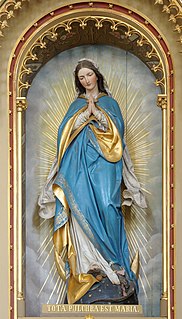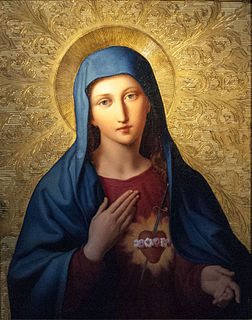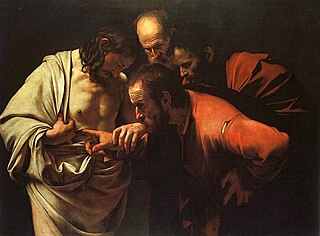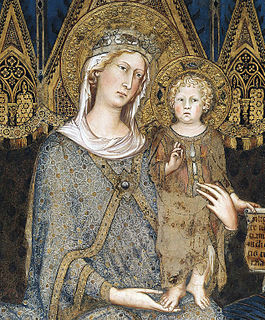
The Holy Rosary, also known as the Dominican Rosary, or simply the Rosary, refers to a set of prayers used in the Catholic Church and to the string of knots or beads used to count the component prayers. When referring to the prayer, the word is usually capitalized ; when referring to the beads, it is written with a lower-case initial letter.

The Sacred Heart, also known as the Sacred Heart of Jesus or Most Sacred Heart of Jesus, is one of the most widely practised and well-known Catholic devotions, wherein the heart of Jesus is viewed as a symbol of "God's boundless and passionate love for mankind". This devotion to Christ is predominantly used in the Catholic Church, followed by high-church Anglicans, Lutherans and some Western Rite Orthodox. In the Latin Church, the liturgical Solemnity of the Most Sacred Heart of Jesus is celebrated the third Friday after Pentecost. The 12 promises of the Most Sacred Heart of Jesus are also extremely popular.

Our Lady of Fátima (Portuguese: Nossa Senhora de Fátima, formally known as Our Lady of the Holy Rosary of Fátima,, is a Catholic title of Mary, mother of Jesus, based on the Marian apparitions reported in 1917 by three shepherd children at the Cova da Iria in Fátima, Portugal. The three children were Lúcia dos Santos and her cousins Francisco and Jacinta Marto. The bishop of Leiria, José Alves Correia da Silva, declared the events worthy of belief on 13 October 1930.

Queen of Heaven is a title given to the Virgin Mary, by Christians mainly of the Catholic Church and, to a lesser extent, in Anglicanism, Lutheranism, and Eastern Orthodoxy.
The First Saturdays Devotion, also called the Act of Reparation to the Immaculate Heart of the Blessed Virgin Mary, is a Catholic devotion which, according to Sister Lúcia of Fátima, was requested by the Virgin Mary in an apparition at Pontevedra, Spain, in December 1925. This devotion has been approved by the Roman Catholic Church.

The Fátima prayers are a collection of seven Catholic prayers associated with the 1917 Marian apparitions at Fátima, Portugal. Of the seven prayers, reportedly, the first two were taught to the three child visionaries by the Angel of Peace, the next three were taught to the children by Our Lady of Fátima herself during the course of the apparitions, and the final two were taught to Lúcia dos Santos, the eldest and last survivor of the three, in 1931 by Jesus when she was already a nun. Of the seven prayers, the Rosary Decade Prayer is the best-known and the most widely recited. For each prayer below, an English translation is given alongside the Portuguese original.

The "Salve Regina", also known as the "Hail Holy Queen", is a Marian hymn and one of four Marian antiphons sung at different seasons within the Christian liturgical calendar of the Catholic Church. The Salve Regina is traditionally sung at Compline in the time from the Saturday before Trinity Sunday until the Friday before the first Sunday of Advent. The Hail Holy Queen is also the final prayer of the Rosary.

The Pontevedra apparitions are the Marian apparitions that Sister Lúcia, the Portuguese seer of Our Lady of Fátima, reported receiving while living in a Dorothean convent in Pontevedra, Spain.

The Immaculate Heart of Mary is a Roman Catholic devotional name used to refer to the Catholic view of the interior life of Mary, mother of Jesus, her joys and sorrows, her virtues and hidden perfections, and, above all, her virginal love for God the Father, her maternal love for her son Jesus Christ, and her motherly and compassionate love for all mankind. Traditionally, the Immaculate Heart is depicted pierced with seven swords or wounds, in homage to the seven dolors of Mary and roses, usually red or white, wrapped around the heart.
Flores de Mayo is a festival held in the Philippines in the month of May. It is one of the May devotions to the Blessed Virgin Mary and lasts for the entire month.

Catholic devotions are particular customs, rituals, and practices of worship of God or honour of the saints which are in addition to the liturgy of the Catholic Church. The United States Conference of Catholic Bishops describes devotions as "expressions of love and fidelity that arise from the intersection of one's own faith, culture and the Gospel of Jesus Christ". Devotions are not considered part of liturgical worship, even if they are performed in a church or led by a priest, but rather they are paraliturgical. The Congregation for Divine Worship at the Vatican publishes a Directory on Popular Piety and the Liturgy.

Since the Crucifixion of Jesus Christ on Calvary, a number of people have claimed to have had visions of Jesus Christ and personal conversations with him. Some people make similar claims regarding his mother, Mary, who is often known as the Virgin Mary. Discussions about the authenticity of these visions have often invited controversy. The Catholic Church endorses a fraction of these claims, and various visionaries it accepts have achieved beatification, or even sainthood.

Mary, the mother of Jesus in Christianity, is known by many different titles, epithets, invocations, and several names associated with places.
Reparation is a theological concept closely connected with those of atonement and satisfaction. In ascetical theology, reparation is the making of amends for insults given to God through sin, either one's own or another's. The response of man is to be reparation through adoration, prayer, and sacrifice. In Roman Catholic tradition, an act of reparation is a prayer or devotion with the intent to expiate the "sins of others", e.g. for the repair of the sin of blasphemy, the sufferings of Jesus Christ or as Acts of Reparation to the Virgin Mary.

Catholic tradition and Mariology include specific prayers and devotions as acts of reparation for perceived insults and blasphemies against Mary, mother of Jesus, often known as the Blessed Virgin Mary to Catholics. Similar prayers as Acts of Reparation to Jesus Christ and Acts of Reparation to The Holy Trinity also exist.

Catholic tradition includes specific prayers and devotions as acts of reparation for insults and blasphemies against Jesus Christ and the Holy Name of Jesus. These include the sufferings during the Passion of Jesus. Similar prayers as Acts of Reparation to the Virgin Mary and Acts of Reparation to The Holy Trinity also exist.

The Mariology of the popes is the theological study of the influence that the popes have had on the development, formulation and transformation of the Roman Catholic Church's doctrines and devotions relating to the Blessed Virgin Mary.

The veneration of Mary, mother of Jesus in the Catholic Church encompasses various Marian devotions which include prayer, pious acts, visual arts, poetry, and music devoted to the Virgin Mary. Popes have encouraged it, while also taking steps to reform some manifestations of it. The Holy See has insisted on the importance of distinguishing "true from false devotion, and authentic doctrine from its deformations by excess or defect". There are significantly more titles, feasts, and venerative Marian practices among Roman Catholics than in other Western Christian traditions. The term hyperdulia indicates the special veneration due to Mary, greater than the ordinary dulia for other saints, but utterly unlike the latria due only to God.

The Alliance of the Hearts of Jesus and Mary refers to the historical, theological and spiritual links in Catholic devotions to the Sacred Heart of Jesus and the Immaculate Heart of Mary.













